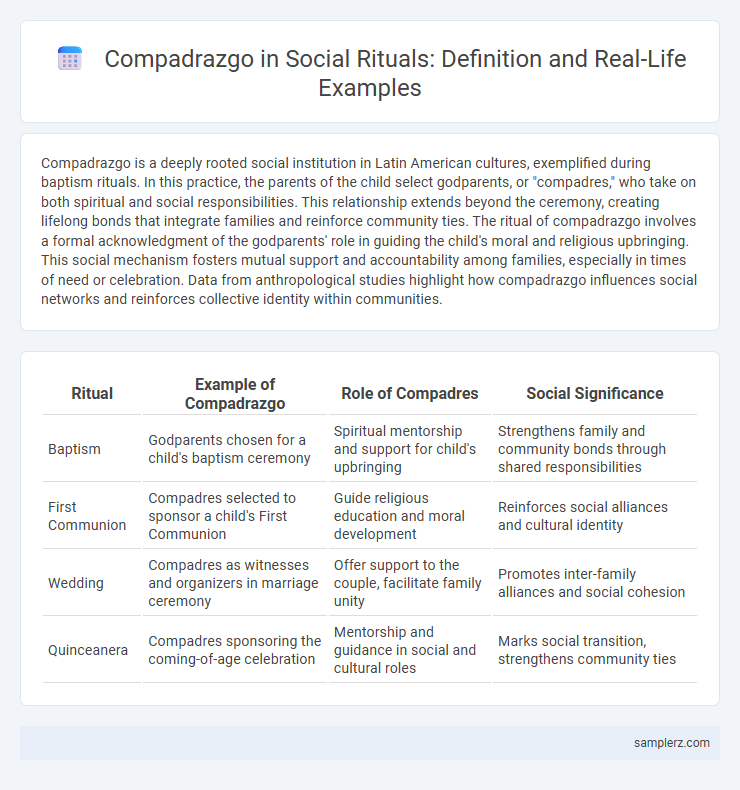Compadrazgo is a deeply rooted social institution in Latin American cultures, exemplified during baptism rituals. In this practice, the parents of the child select godparents, or "compadres," who take on both spiritual and social responsibilities. This relationship extends beyond the ceremony, creating lifelong bonds that integrate families and reinforce community ties. The ritual of compadrazgo involves a formal acknowledgment of the godparents' role in guiding the child's moral and religious upbringing. This social mechanism fosters mutual support and accountability among families, especially in times of need or celebration. Data from anthropological studies highlight how compadrazgo influences social networks and reinforces collective identity within communities.
Table of Comparison
| Ritual | Example of Compadrazgo | Role of Compadres | Social Significance |
|---|---|---|---|
| Baptism | Godparents chosen for a child's baptism ceremony | Spiritual mentorship and support for child's upbringing | Strengthens family and community bonds through shared responsibilities |
| First Communion | Compadres selected to sponsor a child's First Communion | Guide religious education and moral development | Reinforces social alliances and cultural identity |
| Wedding | Compadres as witnesses and organizers in marriage ceremony | Offer support to the couple, facilitate family unity | Promotes inter-family alliances and social cohesion |
| Quinceanera | Compadres sponsoring the coming-of-age celebration | Mentorship and guidance in social and cultural roles | Marks social transition, strengthens community ties |
Compadrazgo in Baptism Ceremonies
Compadrazgo in baptism ceremonies establishes a formal kinship bond between parents and godparents, creating lifelong social support networks. The ritual involves selecting padrinos to provide spiritual guidance and moral responsibility for the baptized child. This tradition reinforces community cohesion and intergenerational solidarity through shared religious and social obligations.
Ritual Kinship: Godparent Roles in First Communion
Compadrazgo in first communion rituals establishes ritual kinship through the godparents' roles, symbolizing spiritual guidance and social bonding. Godparents actively participate by presenting gifts, leading prayers, and supporting the child's religious education, reinforcing communal ties and moral responsibility. This socially significant relationship extends beyond family, fostering networks of mutual support and cultural continuity.
Compadrazgo and Traditional Wedding Rites
Compadrazgo plays a crucial role in traditional wedding rites by formalizing spiritual kinship between godparents and the couple, reinforcing social bonds within the community. This ritualized relationship involves ceremonies such as the exchange of tokens or prayers during the wedding, symbolizing mutual support and lifelong commitment. These traditions strengthen communal ties and uphold cultural values across generations through the institutionalization of compadrazgo.
Social Obligations at Religious Confirmations
Compadrazgo, a key social institution in Latin American cultures, exemplifies social obligations during religious confirmations by creating lifelong bonds between godparents and the baptized, ensuring mutual support and responsibility. Godparents often participate actively in religious ceremonies, symbolizing their commitment to the spiritual and social upbringing of their godchild within the community. This ritual reinforces social cohesion, trust, and reciprocal obligations that extend beyond the religious context into everyday social interactions.
Compadrazgo in Quinceañera Celebrations
Compadrazgo in Quinceanera celebrations establishes a strong social bond between the quinceanera, her parents, and the godparents who play a pivotal role in guiding her transition to womanhood. The ritual involves godparents presenting symbolic gifts such as the tiara, bible, or rosary, signifying their commitment to the quinceanera's spiritual and moral development. This tradition reinforces community ties and cultural identity, highlighting the importance of support networks within Hispanic societies.
Fostering Community Through Saint Feast Days
Compadrazgo, a ritual kinship system, strengthens social bonds during saint feast days by creating mutual responsibilities among godparents, parents, and community members. These shared roles foster collective participation in organizing celebrations, reinforcing trust and support networks within neighborhoods. Through coordinated rituals, feasts, and prayers, compadrazgo unites diverse families and preserves cultural heritage in social settings.
Ritual Sponsorship in Indigenous Festivals
Ritual sponsorship in Indigenous festivals, exemplified by compadrazgo, strengthens community bonds by assigning godparent roles during ceremonies, ensuring spiritual and social support. These sponsors provide resources and protection, reinforcing reciprocal relationships essential for cultural continuity. Compadrazgo fosters intergenerational ties and collective responsibility within Indigenous social structures.
Compadrazgo in Funeral and Mourning Rituals
Compadrazgo in funeral and mourning rituals strengthens social bonds by assigning godparent roles to close friends or relatives who provide emotional and financial support during bereavement. This practice fosters communal solidarity, ensuring collective participation in mourning and honoring the deceased. Such rituals often include shared responsibilities like organizing wakes, mass offerings, and commemorative ceremonies, highlighting the enduring social network formed through compadrazgo.
Bonding Families in Child Naming Ceremonies
Compadrazgo strengthens family ties by establishing spiritual kinship during child naming ceremonies, where parents and godparents formally commit to mutual support and guidance. This ritual fosters trust and solidarity, creating extended family networks that transcend biological relationships. Godparents take on social responsibilities, ensuring the child's upbringing aligns with cultural and moral values within the community.
Continuity of Compadrazgo in Modern Religious Events
Compadrazgo remains a vital element in modern religious events such as baptisms and confirmations, where godparents are ceremonially chosen to establish lifelong spiritual kinship. This ritual continuity reinforces social bonds and communal identity, embedding traditional values within contemporary faith practices. The enduring presence of compadrazgo exemplifies its role in maintaining intergenerational connections and cultural heritage in urban and rural communities alike.

example of compadrazgo in ritual Infographic
 samplerz.com
samplerz.com